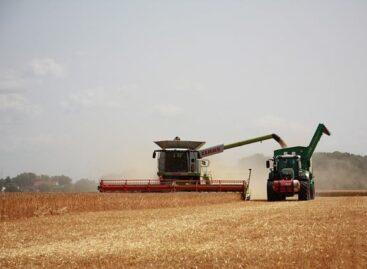Agriculture can meet the challenges through the farming community
With the persistence, knowledge and efforts of the Hungarian farming community, the Hungarian agriculture and food industry can meet the challenges before it and find the answers that can ensure Hungary’s food security and the highest possible export performance, the Minister of Agriculture stated on Tuesday in Kecskemét.

(Photo: AM/Tibor Vermes)
István Nagy said at the Portfolio Agrárium 2024 conference that it was thanks to the performance of the agricultural economy that “the Hungarian economy did not slip into recession last year, so the Hungarian farming community can rightly be proud”. He recalled: the set goal is for the export performance of the greyhound and food industry to increase from 10 billion euros to 15 billion euros by 2030, while last year it already closed with a record of 13.8 billion euros. “So there is reason to say thank you, and let these achievements give strength to the Hungarian farming community in their difficulties and everyday struggles,” he said. The minister reminded that last year the amount of subsidies successfully applied for exceeded HUF 1,400 billion, which is also a record and shows that “Hungary has a farmer-friendly government”. About this year, he said: the first call for tenders is already available for compensatory support related to Natura 2000 lawn areas, and soon the first calls for tenders for agricultural and food industry investments will also be available. According to previous plans, the new irrigation development support scheme for agricultural farms will be finalized by April, and the support package for generational change will be ready by summer. It is estimated that at the end of the year, another investment tender package will be announced, which, among other things, will support precision farming and the technological renewal of crop cleaning and drying – explained István Nagy. As he said, they are working to ensure that “in the period up to 2027, EU funds, together with the outstanding proportion of the national budget contribution, are more helpful than ever before for rural development, farmers and food processors”.
According to the minister, with the help of the programs, the productivity of Hungarian agriculture can increase by one and a half times and its added value by two times by the end of the decade
István Nagy also reported that since April 20 last year, almost 165,000 uniform applications have been received, now based on the new EU rules. He called it an important fact that from mid-October to March 7 this year, 150,000 farmers had access to HUF 355 billion in first-pillar legal titles in 15 legal titles, and in addition to that, HUF 90 billion was already available in the case of second-pillar schemes handled within the framework of unified applications. at farmers”. Regarding the results of the European farmers’ demonstrations, the Minister of Agriculture said that the current Belgian presidency of the European Council collected the proposals of all EU member states in order to reduce the administrative burdens related to the Common Agricultural Policy (CAP) subsidies, to which Hungary submitted 45 amendment proposals. On March 15, the European Commission published its official package of proposals to change the EU rules of the CAP, the largest part of which is aimed at easing the rules of conditionality. The minister called it an important result that the package of proposals fulfills several requests from the Hungarian side, among which he highlighted making the crop rotation obligation replaceable by crop diversification and canceling the mandatory set-aside. He added: no matter how the fate of the package turns out, “the Hungarian government will continue to fight for all the stated goals, which it considers essential for further simplification, in the interests of farmers.” István Nagy explained that “they are preparing for Hungary’s presidency of the European Union with a definite vision.” I would like to use the second half of the year to review the options for market crisis management together with the other member states, taking into account the changing climatic, market and economic conditions of the past years. He called it necessary to strengthen action against food waste and to encourage agricultural and food industry research.
MTI
Related news
Food and beverage innovation plunges nearly 50% since 2007: Mintel
The market research firm said about a quarter of items…
Read more >The net sales revenue of all groups of ornamental plants increased in 2023
In 2023, according to data received as part of the…
Read more >Related news
Valeo Foods Completes Acquisition Of Appalaches Nature
Valeo Foods Group has completed the acquisition of Appalaches Nature,…
Read more >Carrefour grows in France and Brazil, lags behind in rest of Europe
Carrefour says it is rather pleased with its financial results…
Read more >Food and beverage innovation plunges nearly 50% since 2007: Mintel
The market research firm said about a quarter of items…
Read more >







